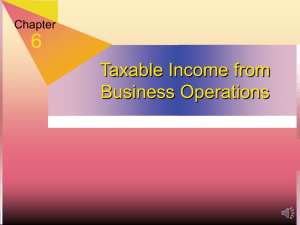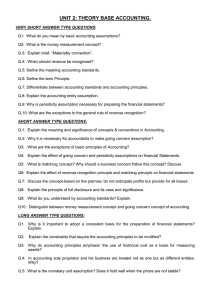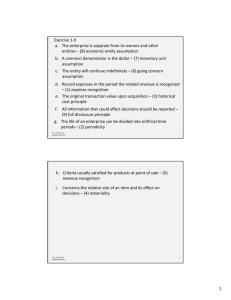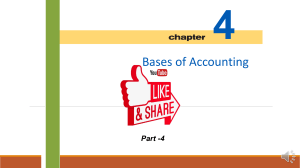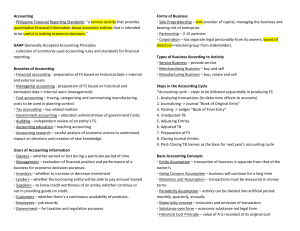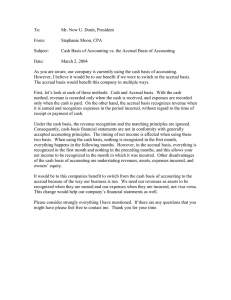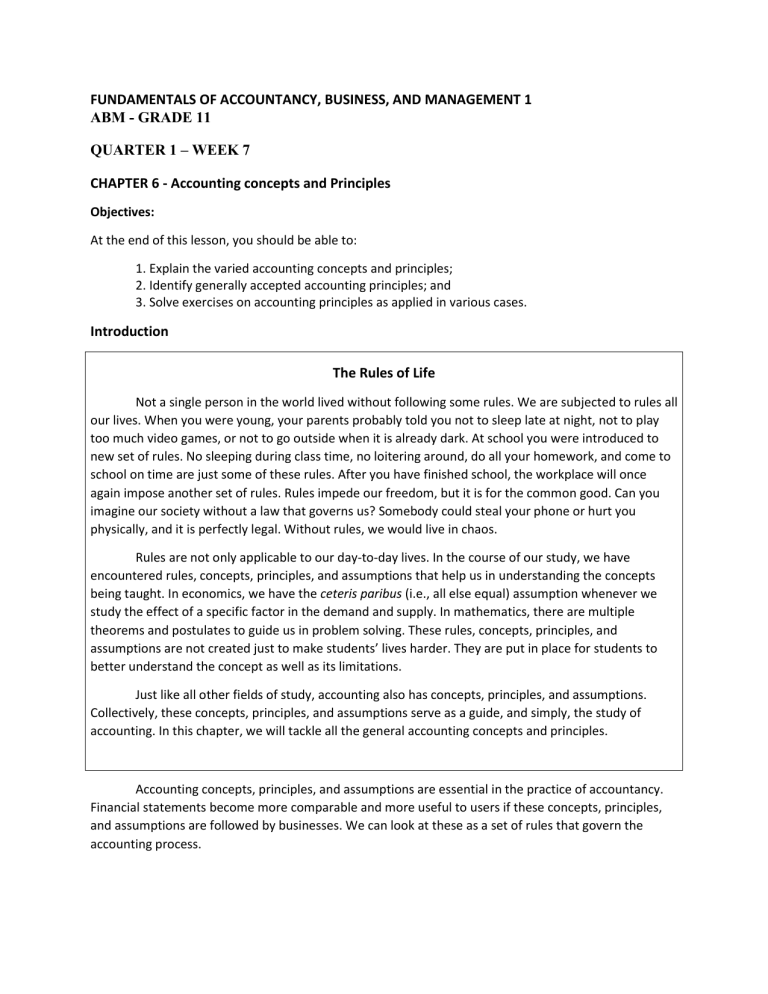
FUNDAMENTALS OF ACCOUNTANCY, BUSINESS, AND MANAGEMENT 1 ABM - GRADE 11 QUARTER 1 – WEEK 7 CHAPTER 6 - Accounting concepts and Principles Objectives: At the end of this lesson, you should be able to: 1. Explain the varied accounting concepts and principles; 2. Identify generally accepted accounting principles; and 3. Solve exercises on accounting principles as applied in various cases. Introduction The Rules of Life Not a single person in the world lived without following some rules. We are subjected to rules all our lives. When you were young, your parents probably told you not to sleep late at night, not to play too much video games, or not to go outside when it is already dark. At school you were introduced to new set of rules. No sleeping during class time, no loitering around, do all your homework, and come to school on time are just some of these rules. After you have finished school, the workplace will once again impose another set of rules. Rules impede our freedom, but it is for the common good. Can you imagine our society without a law that governs us? Somebody could steal your phone or hurt you physically, and it is perfectly legal. Without rules, we would live in chaos. Rules are not only applicable to our day-to-day lives. In the course of our study, we have encountered rules, concepts, principles, and assumptions that help us in understanding the concepts being taught. In economics, we have the ceteris paribus (i.e., all else equal) assumption whenever we study the effect of a specific factor in the demand and supply. In mathematics, there are multiple theorems and postulates to guide us in problem solving. These rules, concepts, principles, and assumptions are not created just to make students’ lives harder. They are put in place for students to better understand the concept as well as its limitations. Just like all other fields of study, accounting also has concepts, principles, and assumptions. Collectively, these concepts, principles, and assumptions serve as a guide, and simply, the study of accounting. In this chapter, we will tackle all the general accounting concepts and principles. Accounting concepts, principles, and assumptions are essential in the practice of accountancy. Financial statements become more comparable and more useful to users if these concepts, principles, and assumptions are followed by businesses. We can look at these as a set of rules that govern the accounting process. Accounting concepts, principles, and assumptions serve as the foundation of accounting in order to avoid misunderstanding and enhance the understanding and usefulness of the financial statements. The following are the accounting concepts, principles, and assumptions: 1. Accrual accounting 2. Matching principle 3. Use of judgment and estimates 4. Prudence 5. Substance over form 6. Cash basis of accounting 7. Going concern assumption 8. Accounting entity assumption 9. Time period assumption 10. Generally Accepted Accounting Principles (GAAP) 11. International Financial Reporting Standards (IFRS) 12. Philippine Financial Reporting Standards (PFRS) Summary/ Definition of Terms • • • • • • • • • • • Accrual accounting – an accounting basis wherein income is recognized when earned and expenses are recognized when incurred irrespective of the timing of cash receipt or payment. Accrual accounting results in more accurate financial statements. Cash basis of accounting – opposite of the accrual basis of accounting; recognizes income when cash is received and recognizes expenses when cash is paid. Matching principle – a concept closely related to accrual accounting which states that expenses should be recorded in the same period as the related revenues. Accounting judgments and estimates – not all items in a company’s accounting records can be determined precisely. This is the reason why estimates are used. Estimates are determined using professional judgment, study of historical data, and through research. Prudence – also called conservatism. Prudence means exercising care in decisions regarding recognition of items in the accounting records. In case of doubt, recognize liabilities and expenses and do not recognize assets and income. Substance over form – the substance of some business transactions differ from their legal form. A common example of this is a contract of lease. If substance differs from legal form, you should follow the treatment of transaction based on the substance. Going concern assumptions – the assumption that the entity will continue operations indefinitely into the future. It can be abandoned if there are evidences supporting the contrary. Accounting entity assumption – the assumption that the business is an entity separate and distinct from the owners, managers, and employees. Personal transactions of owners, managers, and employees should not distort the results of company operations. Time period assumptions – the assumption that the indefinite life of a company can be divided into multiple time period with equal lengths. The result of this is the periodic presentation of company’s financial statements. A calendar year is a 12-month period that ends on December 31. A fiscal year is a 12-month period that may begin on any month except January and ends on any month. Generally Accepted Accounting Principles (GAAP) – a set of accounting principles, concepts, rules, and guidelines that companies follow to enhance the consistency and comparability of their financial statements. International Financial Reporting Standards (IFRS) – pronouncements made by the IASB that intend to enhance the consistency and comparability of the financial statements of the companies all around the world. • Philippine Financial Reporting standards (PFRS) – the Philippine version of IFRS. It includes the pronouncements of the IFRS, the PAS which corresponds with the IAS, and the interpretations of accounting standards by the Philippine Interpretations Committee. Discussion Questions 1. What is the accrual basis of accounting? What is the cash basis of accounting? 2. What are the advantages of accrual accounting over the cash basis? 3. Explain the concept of matching principle. 4. Describe the concept of prudence, accounting judgement, accounting estimates. 5. Discuss the other concepts and principles. Activities/Practice exercise Below are accounting concepts and principles. Match each description to the correct accounting concept and principle. Accrual Accounting Accounting Entity Assumption Going Concern Prudence Cash Basis Time Period Assumption Use of Judgement and Estimates Matching Type Substance over Assumption Form TPA 1. The indefinite life of a company can be divided into periods of equal length for the preparation ____ of financial reports. PRUDENCE ____ 2. Income and assets are not overstated and liabilities and expenses are not overstated. Accrual ____ 3. Income should be recognized in the period when it is earned regardless of when the payment is received. Accouting Entity ____ 4. The business is separate from the owners, managers, and employees operating the business. Matching ____ 5. Expenses are recognized in the same period as the related revenue. Judgement and Estimates ____ 6. Approximations made by accountants or the management in the preparation of financial statements. Going Concern ____ 7. It is assumed that the operations of a business will continue indefinitely into the future. Substance over____ form 8. A common example of this is a contract of lease. Cash____ Bais 9. It recognizes income when cash is received and recognizes expenses when cash is paid. IFRS ___ 10. It is a pronouncement made by IASB. Evaluation Multiple Choice. Choose the letter of the best answer and write it on blank. ____ 1. XYZ Company sold goods on account (credit) for 200,000 pesos. How should revenues be recorded if it uses accrual accounting? a. record revenue/sales in the accounting book even if it is not yet paid sales since it is not yet paid b. record sales in temporary notebook these c. do not record d. none of ____ 2. Mr. Cruz owns a hardware business. He estimates that the life of his business’ building is 50 yrs. What is the basis of his estimate? a. Accounting Entity Assumption b. Going Concern c. Prudence d. Time period ____ 3. The owner of Hannah Bakeshop separates the earnings of her bakeshop from her personal money. The owner of Hannah Bakeshop applies what principle of accounting? a. Going Concern b. Accounting Entity c. Prudence d. Matching Principle ____ 4. Which of the following can be considered a fiscal year? a. January 1 – December 31 d. October 1 – May 31 b. February 1 – January 31 c. March 1 – December 31 ____ 5. Which do you think would a sari-sari store use in accounting his/her business? a. Accrual accounting b. Cash Basis Accounting c. Matching Principle these Assigned Task: 1. What is the main function or purpose of GAAP? 2. What is the purpose of IFRS? Give possible reasons why IFRS is needed? 3. What is the difference between the IFRS and the PFRS? d. None of
